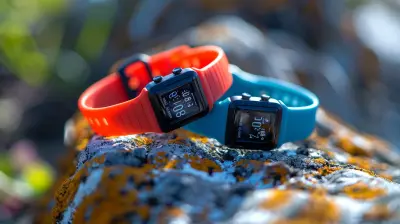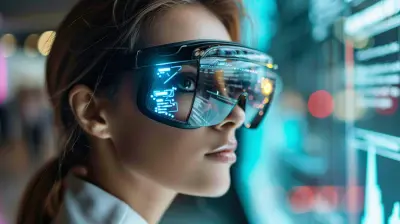Are Fitness Trackers Safe? Addressing Radiation and Health Concerns
1 April 2025
Fitness trackers have become an essential part of modern life, helping people monitor their steps, heart rate, sleep patterns, and even stress levels. But with all the benefits, one big question lingers—are fitness trackers safe?
Many worry about potential health risks, particularly regarding radiation exposure. After all, these gadgets stay strapped to your wrist all day, constantly emitting signals. Are they silently harming us, or is this just another tech-related fear spiraling out of control? Let’s dive in and separate fact from fiction. ![]()
Understanding How Fitness Trackers Work
Before jumping into the health concerns, let's first break down how these devices function.Fitness trackers use a combination of sensors to monitor body movements and other health metrics. Most devices rely on:
- Accelerometers – Track movement and steps.
- Heart Rate Monitors – Use LEDs to measure blood flow.
- Gyroscopes – Detect body orientation.
- GPS – Tracks location for distance-based activities.
- Bluetooth & Wi-Fi – Enable data synchronization with your phone.
For the most part, these functions seem harmless. However, the real concern arises from the wireless radiation these devices emit. ![]()
The Radiation Debate: Should You Be Worried?
Radiation is a scary word. We often associate it with nuclear disasters or harmful X-rays. But not all radiation is created equal. Fitness trackers emit a type called non-ionizing radiation, which is the same kind your smartphone or Wi-Fi router produces.Understanding Non-Ionizing Radiation
The electromagnetic spectrum is divided into two categories:- Ionizing Radiation (harmful) – Found in X-rays and gamma rays, capable of damaging DNA.
- Non-Ionizing Radiation (generally considered safe) – Includes Bluetooth, Wi-Fi, and radio waves.
The concern with fitness trackers is that they use Bluetooth, a low-powered non-ionizing radiation, to constantly sync data. But does this make them dangerous? ![]()
What Science Says About Fitness Tracker Radiation
Many studies have looked into the effects of non-ionizing radiation. Here’s what we know so far:1. Low Radiation Exposure
- Fitness trackers emit significantly less radiation than smartphones.
- Bluetooth operates at a fraction of the power of cellular signals.
- Studies suggest that low-powered Bluetooth radiation is not strong enough to penetrate deep tissue or cause harm.
2. No Proven Health Risks
- The World Health Organization (WHO) states that non-ionizing radiation from Bluetooth and Wi-Fi is not conclusively linked to health problems.
- Large-scale studies on mobile phones (which emit much stronger signals) have found no definitive link to cancer or brain damage.
3. Minimal Skin Contact Issues
- Some users report skin irritation from wearing fitness trackers for extended periods.
- This is more likely caused by sweat, dirt buildup, or allergic reactions to materials rather than radiation exposure.
So far, there's no solid scientific evidence proving fitness trackers are dangerous. ![]()
Potential Concerns: What Could Go Wrong?
Even though radiation might not be a serious issue, there are still a few potential concerns worth noting.1. Sleep Disruption from EMF Exposure
Some people worry that electromagnetic fields (EMFs) from wearables can affect sleep quality. While there’s no solid proof, some users claim they sleep better without electronic devices nearby.Quick Fix: If you’re concerned, turn off Bluetooth at night or remove the tracker while sleeping.
2. Psychological Dependence on Data
Constantly tracking fitness metrics can lead to obsession or anxiety over health statistics. Some people get hyper-focused on step counts, calorie burns, or sleep scores, leading to stress rather than motivation.Quick Fix: Use the data for guidance, not obsession. Remember, your body knows best.
3. Privacy and Data Security
Wearables collect a ton of personal health data, and that information is often stored on cloud servers. The risk? Data breaches or unauthorized sharing.Quick Fix: Always check the privacy policies of wearable brands and use strong passwords for your accounts.
How to Minimize Any Possible Risks
If you're still uneasy about potential risks, here are some precautions to reduce exposure:- Limit Bluetooth Usage – Turn off Bluetooth when not actively syncing data.
- Rotate Wrist Placement – Switch wrists occasionally to avoid prolonged contact in one area.
- Opt for Manual Syncing – Some fitness trackers allow data collection without constant Bluetooth use—sync manually when needed.
- Take Breaks – Give your skin a break by removing the tracker periodically, especially at night.
- Choose Trustworthy Brands – Reputable companies prioritize user safety and data encryption.
The Verdict: Are Fitness Trackers Safe?
So, are fitness trackers dangerous? Based on the current scientific understanding, the answer is no—at least not from a radiation standpoint.They emit low-powered, non-ionizing radiation, similar to Bluetooth headphones or Wi-Fi routers, which has no proven harmful health effects. The primary concerns are over-reliance on data, privacy risks, and minor skin irritation—all of which can be easily managed.
If you're using a fitness tracker responsibly, there's little reason to worry. Technology is meant to enhance our lives, not create unnecessary fear! So, strap on your tracker, stay active, and focus on what truly matters—your health and well-being.
all images in this post were generated using AI tools
Category:
Fitness TrackersAuthor:

Gabriel Sullivan
Discussion
rate this article
8 comments
Whitney Harris
While fitness trackers offer valuable health insights, the debate over their radiation exposure warrants careful scrutiny. Balancing technological benefits with potential health risks is essential for informed consumer choices.
April 23, 2025 at 8:31 PM

Gabriel Sullivan
Thank you for your thoughtful comment! It's crucial to weigh the benefits of fitness trackers against potential risks, ensuring consumers can make informed decisions about their health technology choices.
Zayden McGarvey
Fitness trackers emit low levels of electromagnetic radiation, which current studies deem safe; however, users should stay informed about potential risks.
April 17, 2025 at 3:51 AM

Gabriel Sullivan
Thank you for your comment! It's important to stay informed about the safety of fitness trackers, and ongoing research will help clarify any potential risks.
Anna McVey
Safety lies in awareness; balance technology's benefits with potential risks.
April 13, 2025 at 3:03 AM

Gabriel Sullivan
Thank you for your insightful comment! It's crucial to stay informed about both the advantages and potential risks of fitness trackers to make safe and healthy choices.
Kiera McLemore
Fitness trackers: the only device that makes you worry about radiation while you’re busy sweating it out. But hey, if it keeps me from finishing that extra slice of pizza, I’m in!
April 12, 2025 at 2:56 AM

Gabriel Sullivan
Thank you for your comment! It's true that fitness trackers can raise concerns about radiation, but most studies indicate they're generally safe. Balancing health goals with enjoyment, like avoiding that extra slice of pizza, is what it’s all about!
Elidi McMeekin
Great article! It's essential to address concerns about fitness trackers and radiation. While current research suggests minimal risks, it's always wise for users to stay informed and consult health professionals if they have specific worries. Balance technology use with personal health!
April 9, 2025 at 12:50 PM

Gabriel Sullivan
Thank you for your insightful comment! Staying informed and consulting health professionals is indeed crucial for users of fitness trackers. Balance is key in integrating technology with health.
Zyana Reilly
Fitness trackers: helping you count steps while avoiding mysterious radiation waves. Because who has time for extra spooky fitness?!
April 7, 2025 at 2:37 AM

Gabriel Sullivan
Thanks for your comment! Fitness trackers are designed with safety in mind, and current research shows that the radiation levels they emit are well within safe limits. It's all about staying healthy without unnecessary worries!
Sylvan Long
Great topic! I’m intrigued by the balance between technology benefits and potential health risks—can we truly have both?
April 6, 2025 at 3:35 AM

Gabriel Sullivan
Thank you! It's a complex issue, but with proper research and regulation, we can strive for a balance that maximizes benefits while minimizing health risks.
Justice McAndrews
Fitness trackers might not make your run faster, but they sure bring a new meaning to 'keeping track'—of your steps, heart rate, and now, your radiation levels! Who knew fitness could be this complex?
April 4, 2025 at 3:48 AM

Gabriel Sullivan
Fitness trackers do add complexity to health monitoring, but they generally operate within safe limits. It's important to stay informed and balanced in our use of technology for fitness.
MORE POSTS

The Future of Electric Vehicles: Beyond Batteries

How IoT is Bridging the Gap Between Physical and Digital Worlds

Edge Computing and Networking: A New Frontier

Leveraging Machine Learning for Smarter Data Analytics

How Augmented Reality is Transforming Customer Support

Voice-Controlled IoT Devices: The Next Frontier